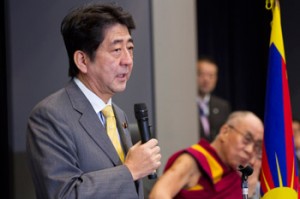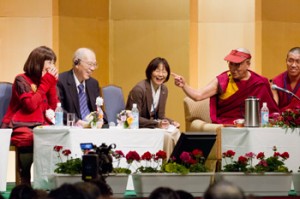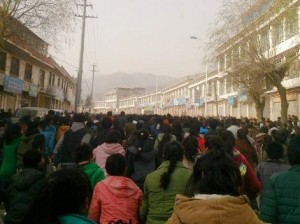
Former Japanese Prime Minister Shinzo Abe welcomes His Holiness the Dalai Lama to the Japanese Parliament
His Holiness the Dalai Lama arrived in Japan on 4 November for a 12-day trip. Traveling to Yokohama, Tokyo, Kanazawa, Okinawa and back to Tokyo he met with various groups, from panel discussions to public talks, concluding with a meeting with the Japanese Parliament. A highlight of the trip was a two-day conference with prominent scientists which offered an opportunity for dialogue on aspects of ancient science meeting modern science.
His Holiness has always had a very deep interest in scientific issues, inner as well as outer observable science. He considers scientists to be curious, open-minded and skeptical of new things. His Holiness feels skepticism is necessary for thorough investigation, calling this the Nalanda Tradition of learning in Buddhism which investigated even the Buddha’s own words. While technology has advanced greatly in the last 200 years, and has almost the power of a religion for some in modern times, it cannot now answer some of humanity’s deepest problems. We must make significant “advances in human compassion,” he said, while pursuing “secular ethics based on scientific findings”.
One of the presentations at the science conference was given by Dr. Fumio Shimura, Professor of Engineering at Shizuoka Institute of Science & Technology, who discussed quantum physics in relation to the Heart Sutra as a different way of considering how form is emptiness, emptiness form – an important Buddhist concept. Even when your brain is full, he said, it is essentially empty. The atom itself also demonstrates this quality. This began a lively discussion with His Holiness on the meaning of form and its various categories in classical Buddhism: that which can be seen; that which can be seen only by its effects (such as the wind); and that which cannot be seen but is still form.
Modern physics has begun emphasizing the interdependence of all things, that nothing is isolated. An example of this, given in the talk by Dr. Haruo Saji, President of Shizuoka Junior College, was the poetic question, “Can you see the clouds in paper?” Paper, he explained, is made of the pulp of trees which need water to grow, most often in the form of rain, which comes from clouds. “I was once told the concept of interdependence did not exist in science,” His Holiness remarked, “but now that word seems to be finding a place.” Combining the concept of interdependence and the idea of the relationship of emptiness and form, he said, that while the present is very, very important, the future is even more so “because the future is still empty, like space. Anything is possible…it is still in our hands.”
Dr. Kazuo Murakami from Tsukuba University, a longtime colleague of His Holiness, spoke on “Switching on Genes to Make Us Shine”. Our genes have an on/off switch, he said, and compared this to His Holiness’ teaching about how to change the world by changing the mind, ridding ourselves of “bad stress” and building up our “good stress”. With amusement he noted that people’s blood sugar levels were greatly lowered when listening to comedians as compared to listening to scientific talks. Not that we should throw out science for only laughter, he said, we need both, but laughter does have the advantage of no side effects. His Holiness then noted how laughter can not only signify great joy, but also discomfort as when someone is tickled too much. Likewise can tears be a sign of both sorrow and happiness. He would like to see more investigation into “the science of tears”.
During His Holiness’ trip to Japan, he also visited Yokohama, where he spoke On Geshe Langri’s “Eight Verses of Training the Mind” to an attendance of more than 6000 people. On a trip to the island of Okinawa he reiterated his two lifelong commitments, the promotion of human values and religious harmony, and again emphasized the enormous importance of dialogue between people and countries with differing opinions, goals, and claims. We must seek the path of peace and this will take action. The younger generations must think deeply on how this can be achieved and it will take great amounts not only of courage, but also deepening compassion for each other.
On 13 November, His Holiness visited the Japanese Parliament Building to speak to members on “Human Values and Universal Responsibility”. In a non-partisan show of support for Tibet and its struggle, around 150 members of the Parliament called upon China to finally address the legitimate issues of the Tibetan people as they call for human rights and an end to China’s ruthless oppression. “We strongly urge the Chinese government to immediately stop the unlawful suppression of the Tibetan people’s human rights and improve the situation. We are ready to send such a message to the international community without any hesitation,” declared the Parliamentarians.
Further, on the connected issue of the self-immolations, His Holiness said when asked in Okinawa, that the Chinese government is “not investigating the real causes of the self-immolations”, but is taking the easy way of “blaming us for all the problems in Tibet”. I have repeatedly “asked them [the Chinese Government] to come to India and check all my files and speeches,” he said. They have not come. If only the 1.3 billion Chinese people knew about the true situation, they could decide what is right and what is wrong, but the heavy blanket of censorship and false information prevents this. “Censorship is totally immoral,” said His Holiness.
His Holiness the Dalai Lama returned to Dharamshala on 15 November.





 Print
Print Email
Email